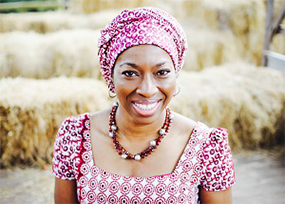Natural Womanhood was fortunate to recently host an online talk given by the powerhouse women’s health activist and biomedical scientist Obianuju “Uju” Ekeocha. If you haven’t had the chance to watch “Target Africa: The Harms of US-funded Contraception Campaigns” yet, we highly encourage you to do so by clicking this link.
Here are four crucial takeaways about Western-funded contraception campaigns in Africa that we learned from Uju’s talk.
#1 The strings attached to Western aid
Much like the IUD, Western aid to Africa comes with strings attached. Uju describes how all too often, in order to receive aid, an African organization must first demonstrate how at least some of the aid will go towards “population programs” (i.e., contraception funding). For example, Western organizations will donate money to build a hospital in Africa, with the caveat that a family planning program must be a major component of hospital operations. Or, for another example, when money is given to schools or universities for things like books and buildings, it is given under the condition that the school also implements a contraceptive program for students.
#2 Doctors are fitting African women with contraceptives the West has rejected, and then refusing to remove them
Women in Africa are being given contraceptives that are no longer on the market in the United States—and for good reason (e.g., Norplant, which is similar to Nexplanon’s predecessor Implanon, and is undetectable via X-ray if it goes missing). Further, they’re being prescribed or fitted with these contraceptives with far less public health infrastructure surrounding them (compared to Western countries) to deal with the issues and side effects that come up.
African women (and teen girls) are administered these methods for free, yet are told they must pay prohibitively large sums to have them removed when they request to have them taken out because of severe side effects. Uju describes how teen girls are also being fitted or implanted with long-acting reversible contraceptives (LARCs) while at school, without the informed consent of their parents.
#3 The Western brand of feminism vs. African feminism
The West is desperately trying to export its brand of feminism to Africa, says Uju. But, as she puts it, Africa already has a robust identity of feminism. The United States was so excited to get its first female Vice President, remarks Uju, but African countries have had 12 female vice presidents already, in addition to numerous female heads of state. And many of the African women in positions of power still value their femininity and roles as wives and mothers above all else, whereas the Western brand of feminism side-steps or rejects these aspects of womanhood.
#4 The truth about the population density of Africa
Westerners are shown images of populous African cities and made to believe that the continent is overpopulated and overrun with people living in terrible conditions—and that population control is therefore necessary. This simply isn’t the case, says Uju. While African cities are undoubtedly crowded, she says, Africa is enormous, and the overall population density of most African countries is far less than many European countries.
If you’d like to learn more about any of these topics, we urge you to watch Uju’s talk. You can also purchase her book Target Africa, or purchase her full-length documentary Strings Attached.
Additional Reading:
Fertility Awareness Methods Can Better Serve African Women Than Contraception and I’m Living Proof
UN Urges Further Reliance Upon Contraceptives, While Pandemic Highlights their Unsustainability
As Breast Cancer Rates Soar, the WHO Doubles Down on Promoting Birth Control
HIV Transmission & Depo-Provera, the Birth Control Shot
Investing in what the world’s poor really want: a response to Bill and Melinda Gates







